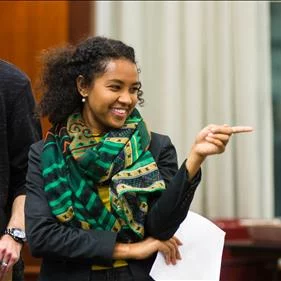Northeastern Hillel celebrates Sigd

Yeshi Mengistu left her native Ethiopia for Israel with her family when she was just 5-years-old.
Mengistu, the Jewish Agency for Israel fellow at Northeastern University Hillel, spoke about her family’s journey and the Ethiopian-Jewish community to more than 40 Jewish students at Northeastern University during a celebration of Sigd, an Ethiopian-Jewish holiday.
The ancient festival, celebrated 50 days after Yom Kippur, marks the renewal of the covenant between God and the Jewish people. For more than 2,500 years, the Ethiopian-Jewish community has observed Sigd by praying, fasting and asking forgiveness for transgressions.
The event, hosted on campus at the Raytheon Amphitheater, was organized by Northeastern Hillel, Mishelanu and Huskies for Israel.
Mengistu said the Ethiopian-Jewish community used to be isolated from the rest of the Jewish community. This led them to believe they were the only Jewish people in the world. They never gave up their faith, and while they were in Ethiopia, they prayed, “to be Jewish in the Holy Land.”
And that’s why Sigd is significant — it served as a way for Ethiopian Jews to keep their connection with God and Judaism.
Mengistu explained how after years of praying, Ethiopian Jews finally ended up in Israel. The first wave of Ethiopian Jews went to Israel in the 1950s. Then, by means of two Israeli government-organized missions, Operation Moses in 1984 and Operation Solomon in 1991, large numbers of Ethiopian Jews were brought to Israel, which is now home to more Ethiopian Jews than anywhere else in the world.
She also shared how efforts to help move Ethiopian Jews to Israel was largely due to financial support from the American-Jewish community, as well as lobbying on behalf of the Ethiopian community.
Students also participated in a demonstration on the proper way to eat Ethiopian food. And for many students, it was their first time eating Ethiopian food.
They learned that lentils, curried vegetables and chicken are traditionally wrapped up in injera, an airy flatbread, and eaten by hand. The flatbread resembles something between pita bread and a crepe.
“The highlight of the event was getting to taste all the different flavors of the Ethiopian culture through amazing food,” said Ariel Kaplan, a freshman studying business administration.
Student organizers also led the group in a trivia game about Ethiopia. They learned about the Ethiopian-Jewish community as well as facts about the nation, including the number of languages spoken in Ethiopia, which is 83.
The room filled with expressions of surprise and curiosity, as people competed to answer the most questions correctly and vied for the top position.
“I never knew that Judaism was practiced in nearly the exact same manners in geographically separated groups around the world,” Kaplan said.
The event culminated in an explanation about how the traditions of Sigd have changed. Sigd is now an official holiday in Israel. Ethiopian Jews and non-Ethiopian Jews celebrate the holiday together by going to the Western Wall. While most Ethiopian Jews no longer live in Ethiopia, and the traditions have changed, the intentions are the same.
“I learned that Ethiopian Jews have great pride in celebrating who they are and are extremely appreciative for the opportunity to be in Israel,” Kaplan said. “It’s intriguing to learn how diverse Judaism truly is.”
Story by Ilana Hirschfeld and photos by Leila Habib.